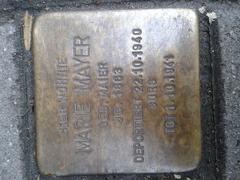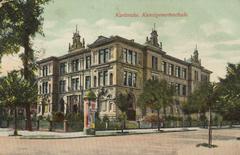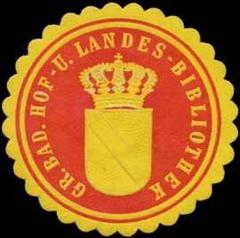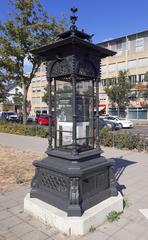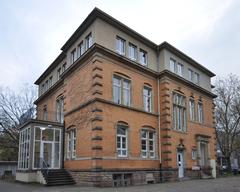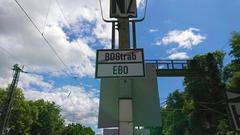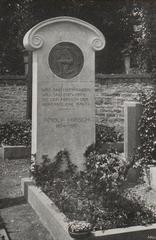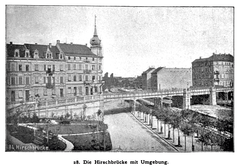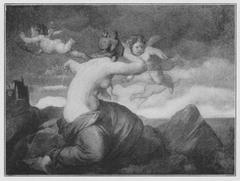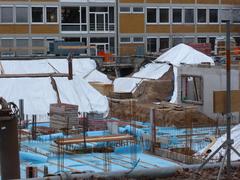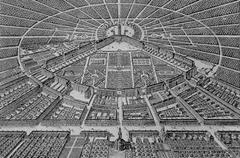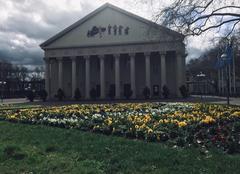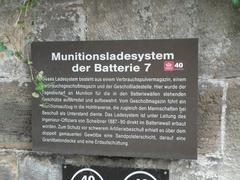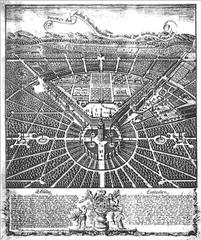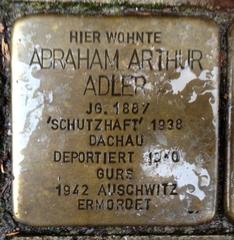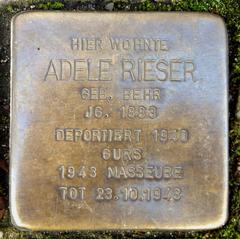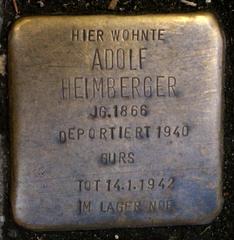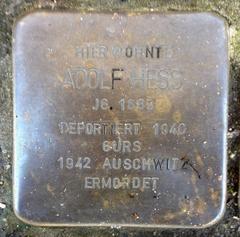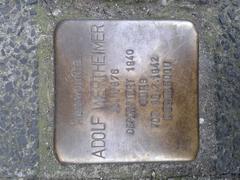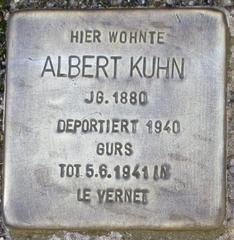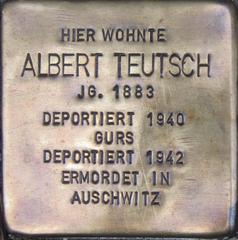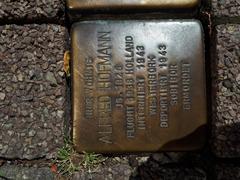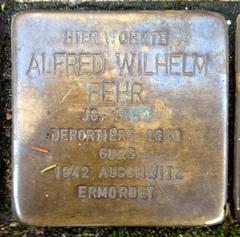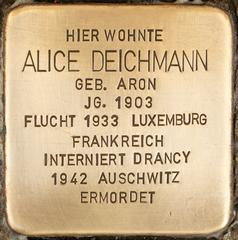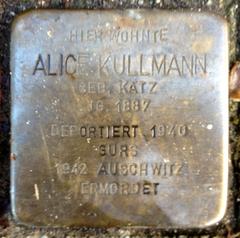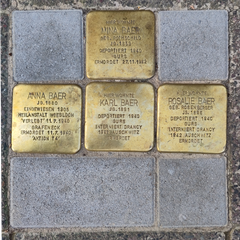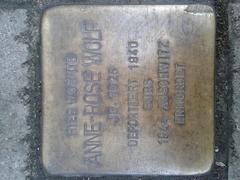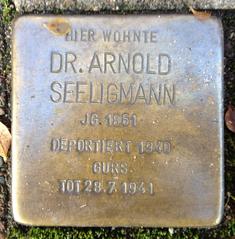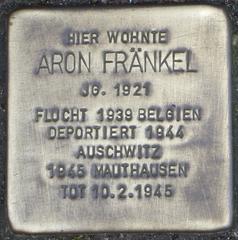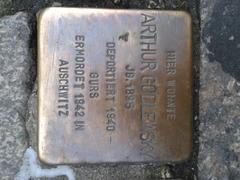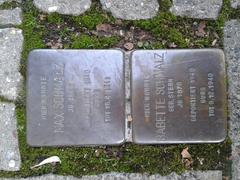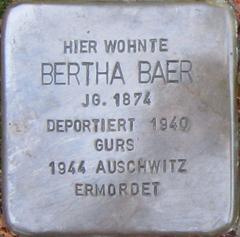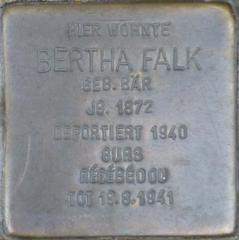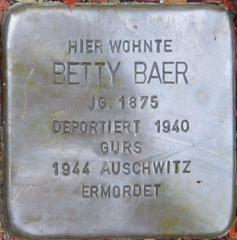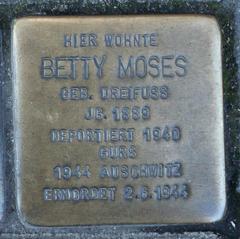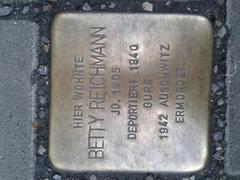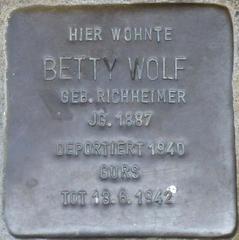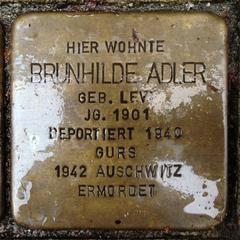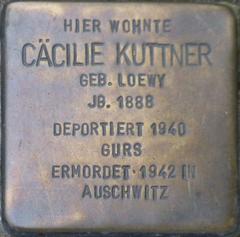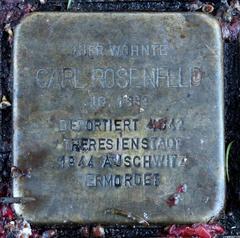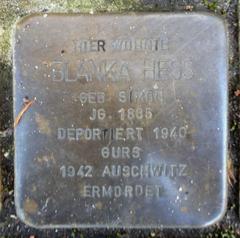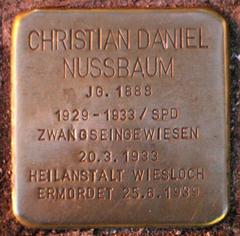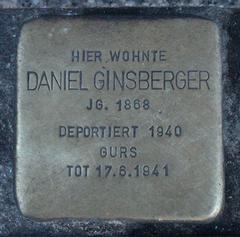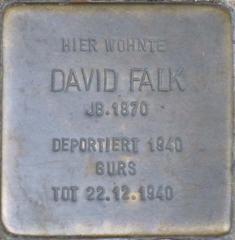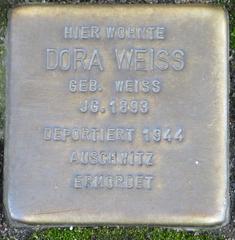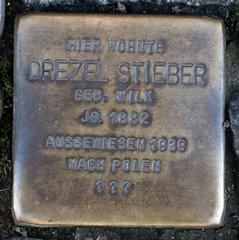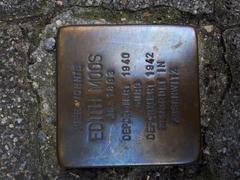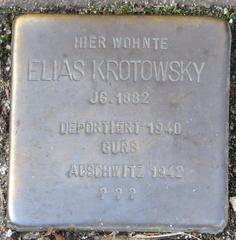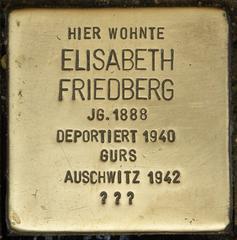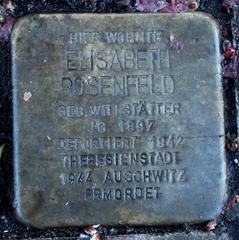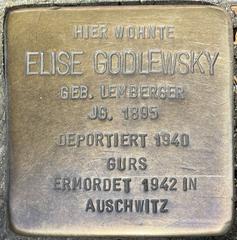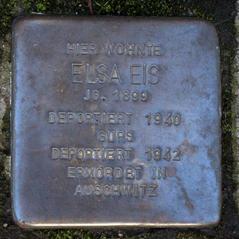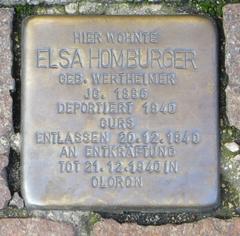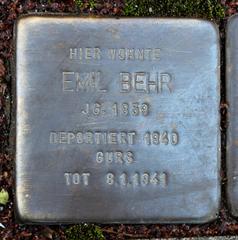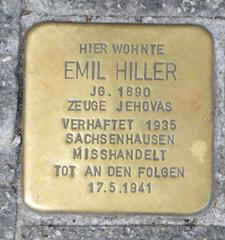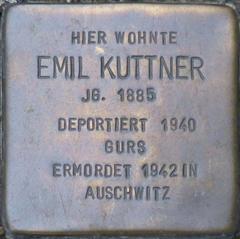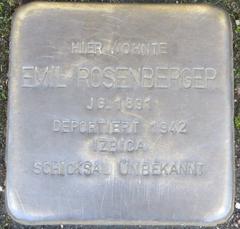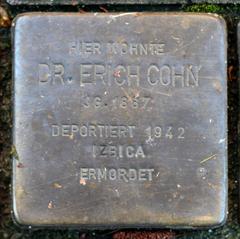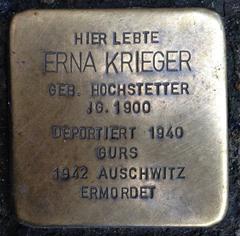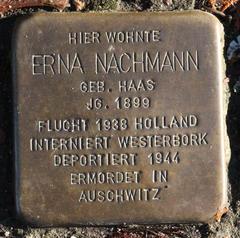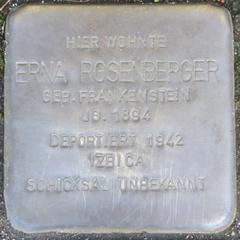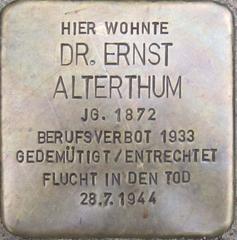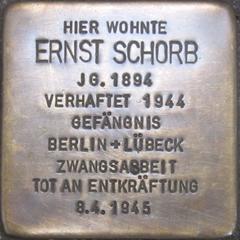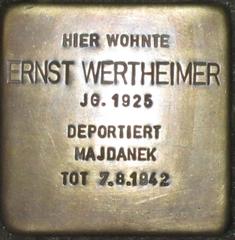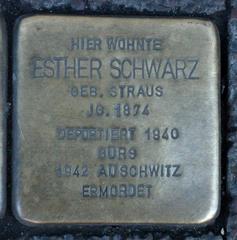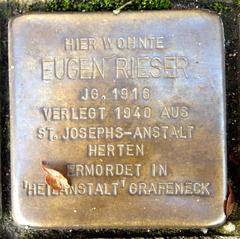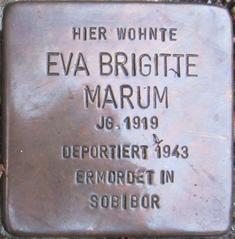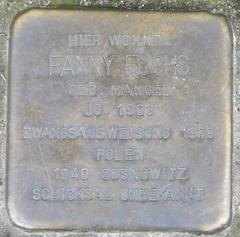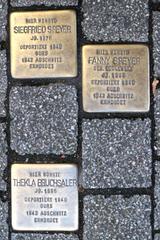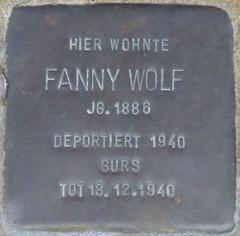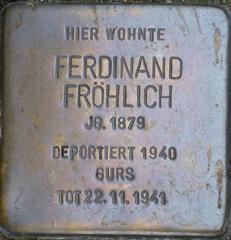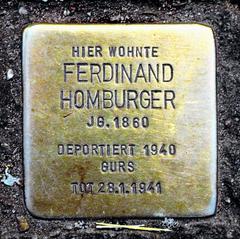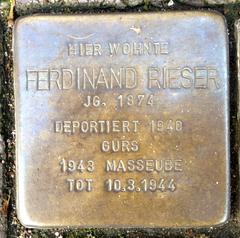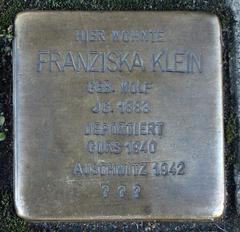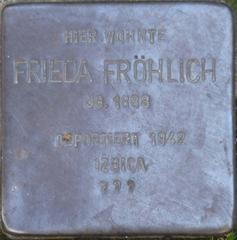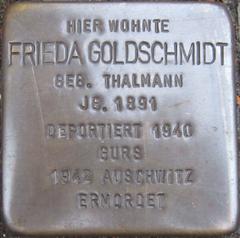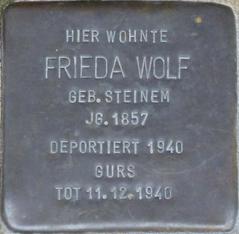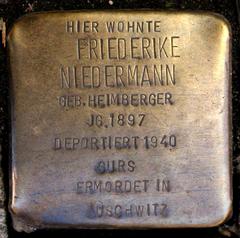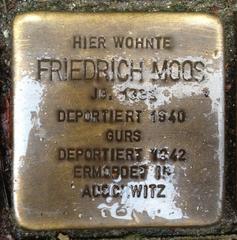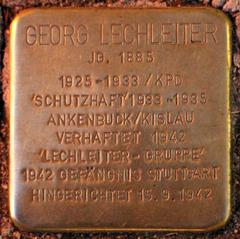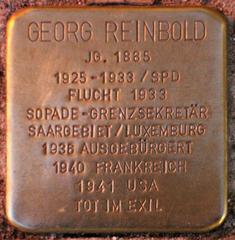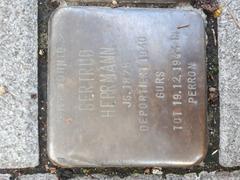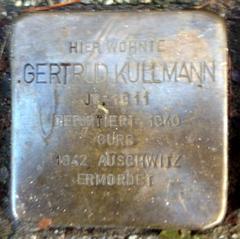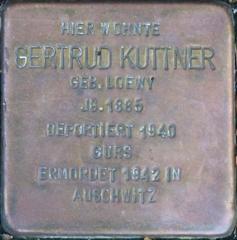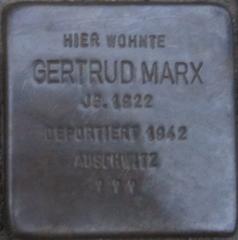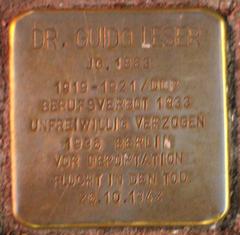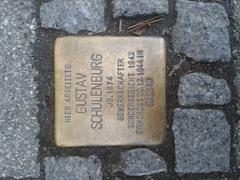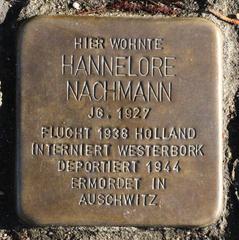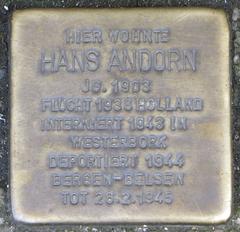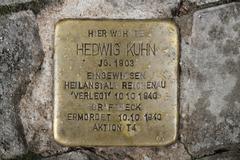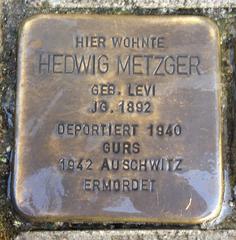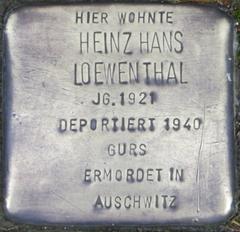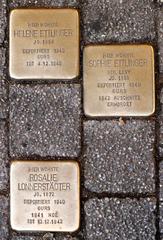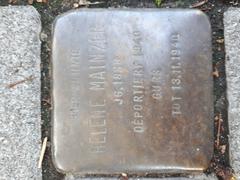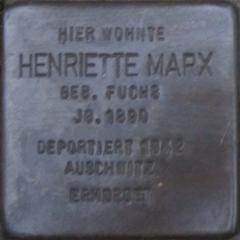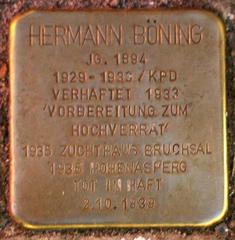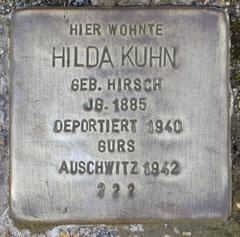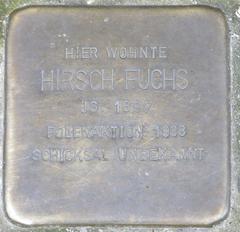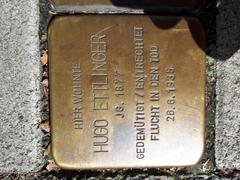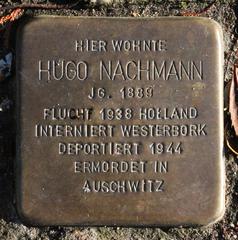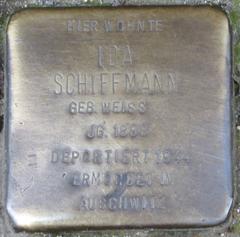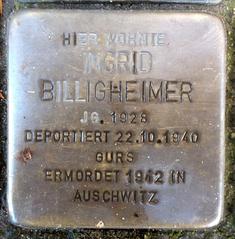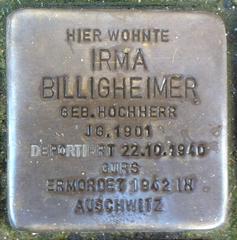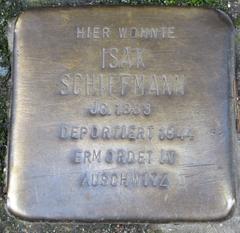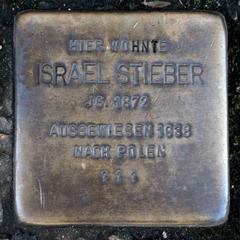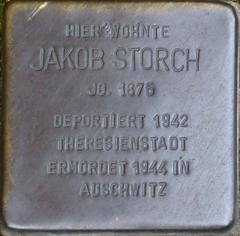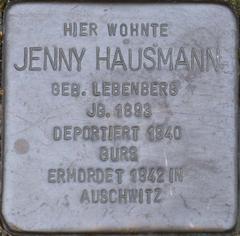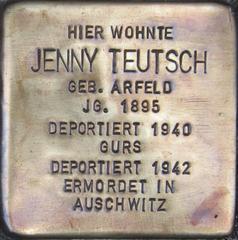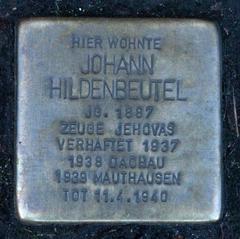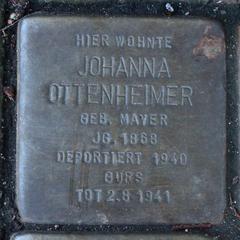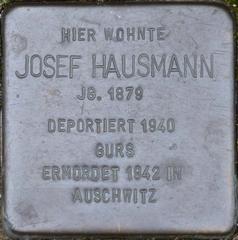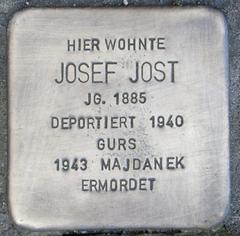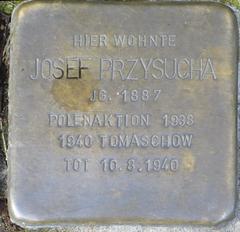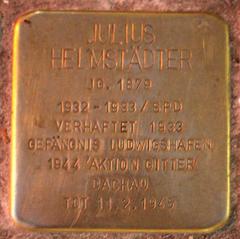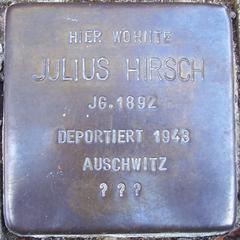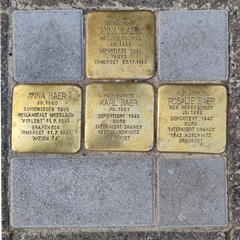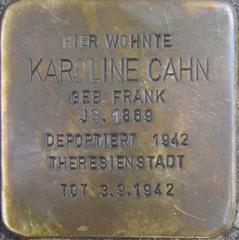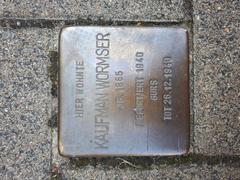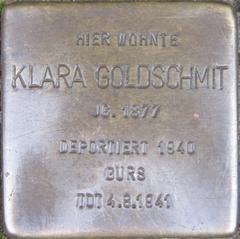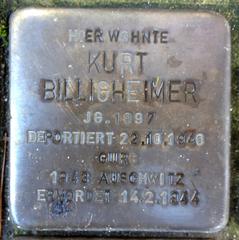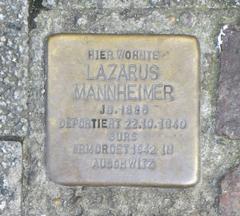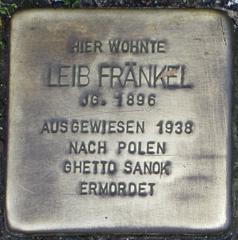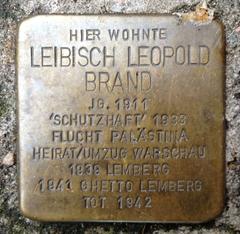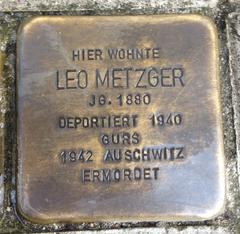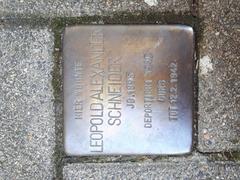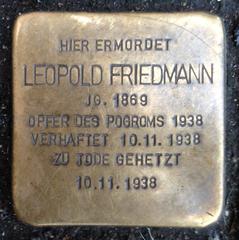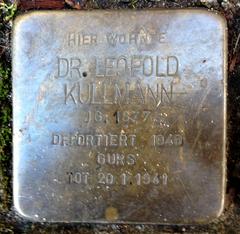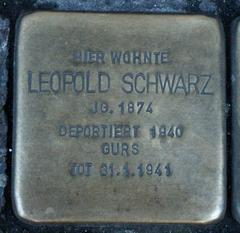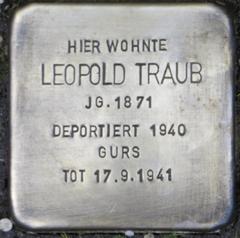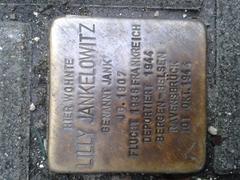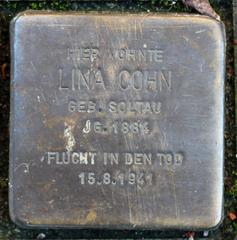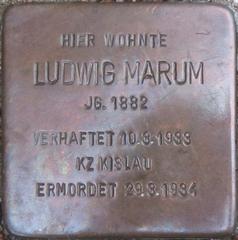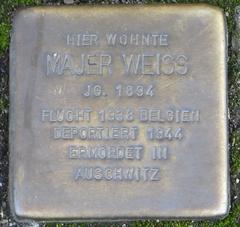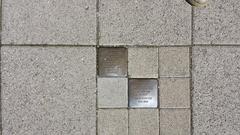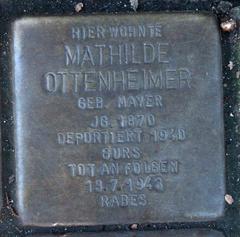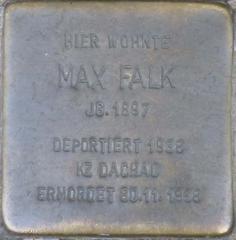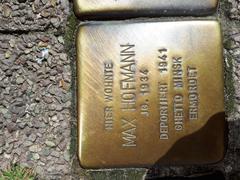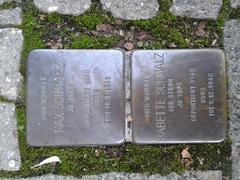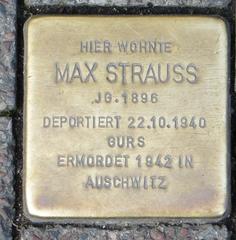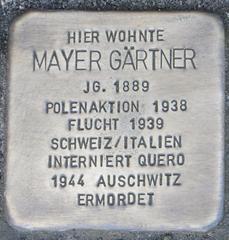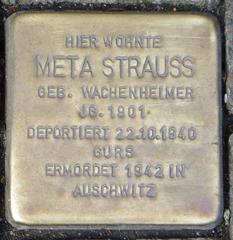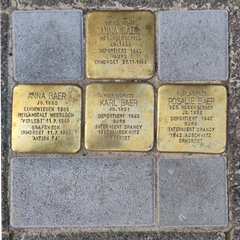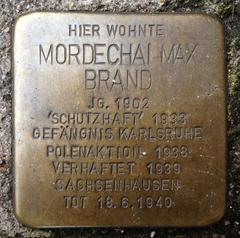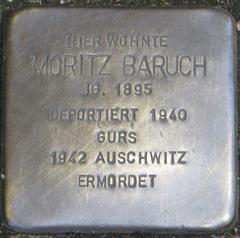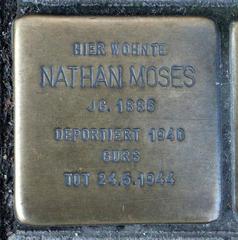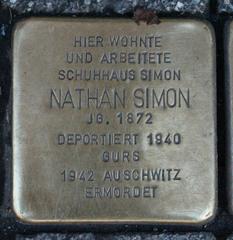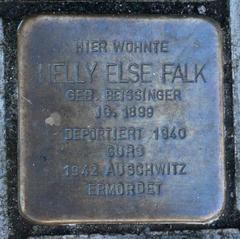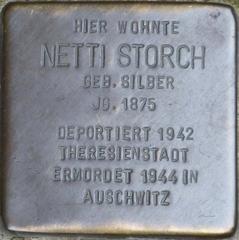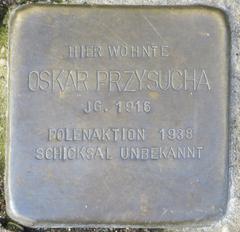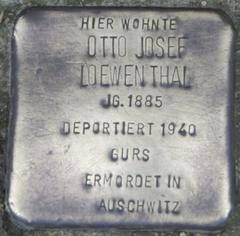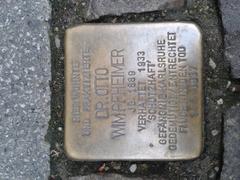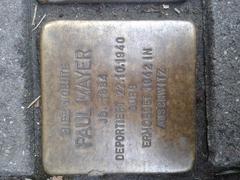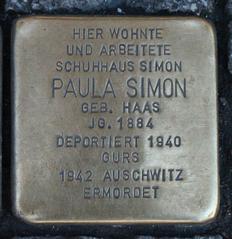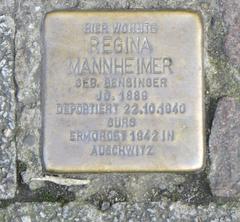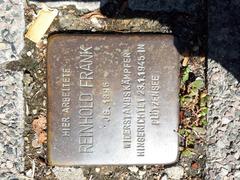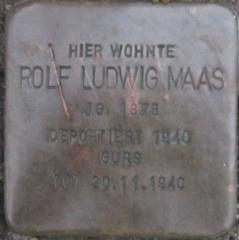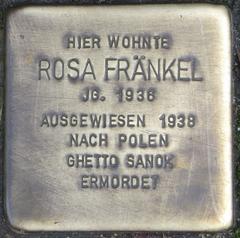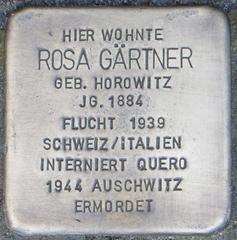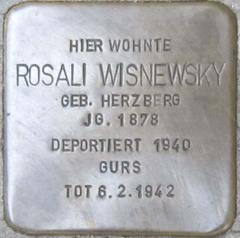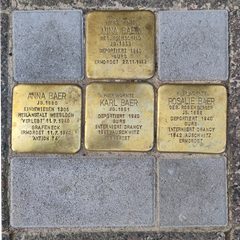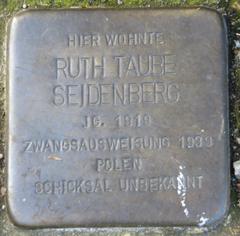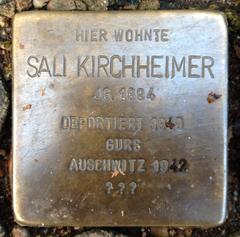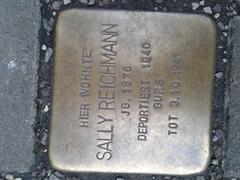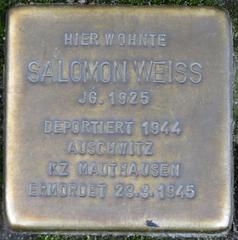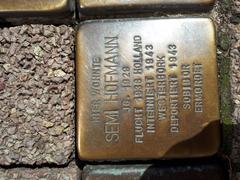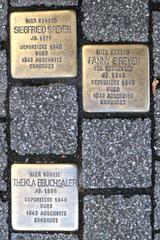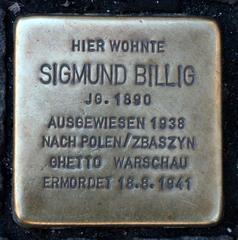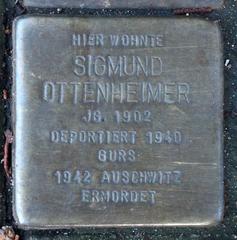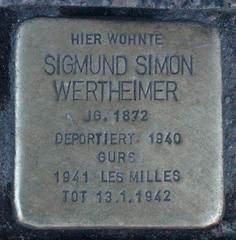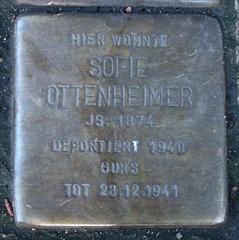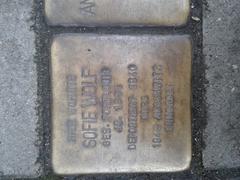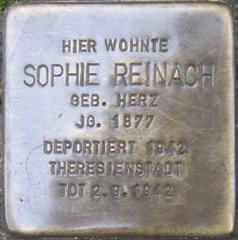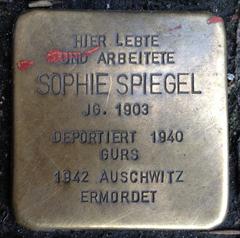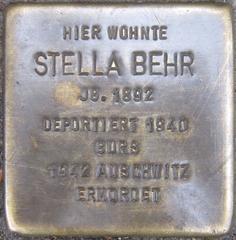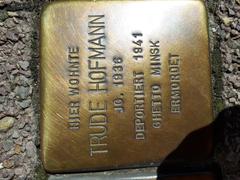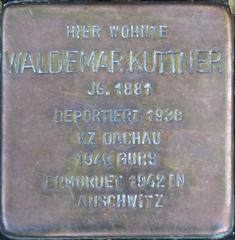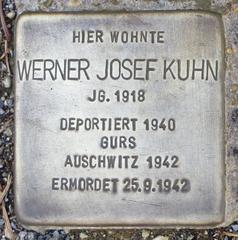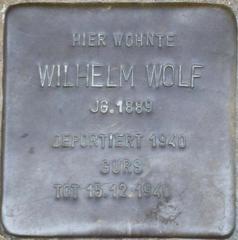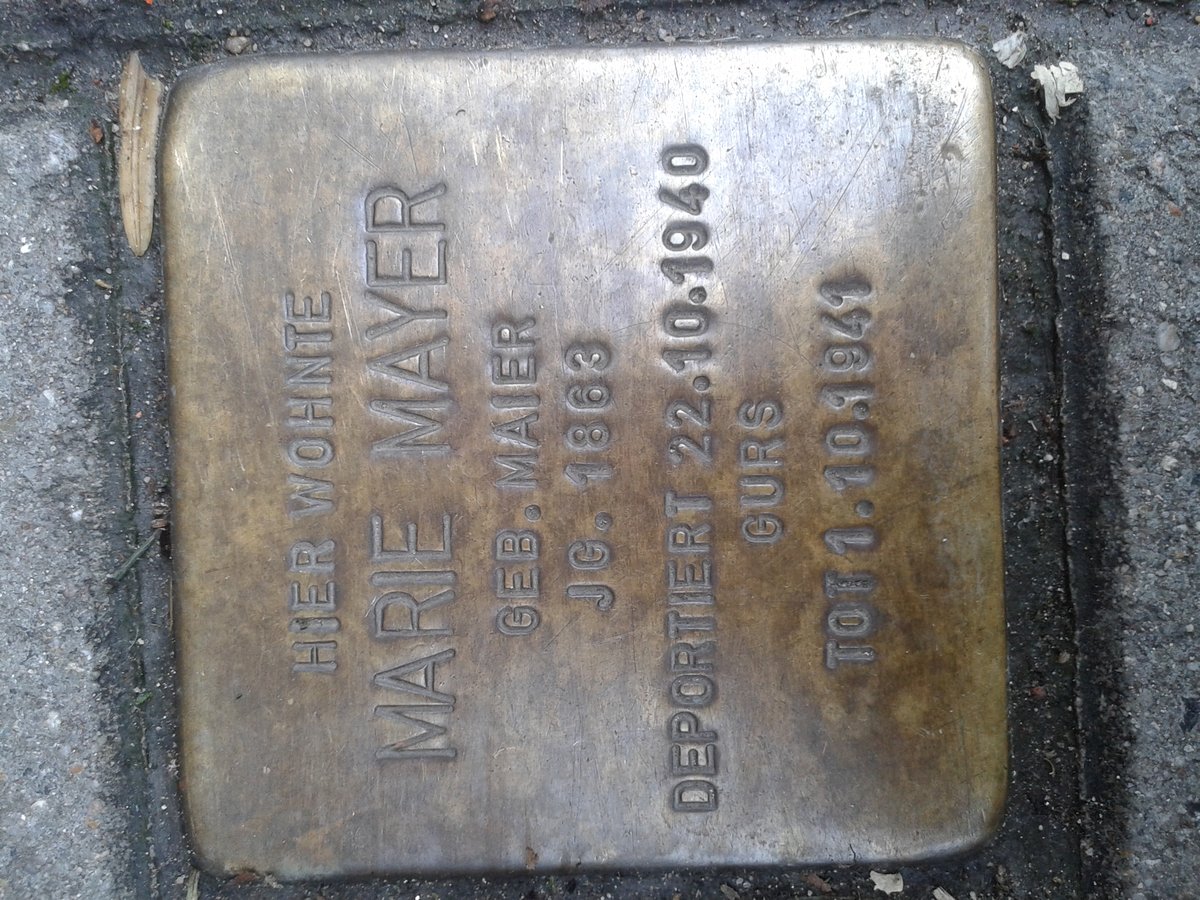
Stolperstein Marie Mayer Karlsruhe: Visiting Hours, Tickets, and Historical Significance
Date: 14/06/2025
Introduction
The Stolperstein dedicated to Marie Mayer in Karlsruhe, Germany, is a poignant memorial within the renowned Stolpersteine (“stumbling stones”) project. Established by artist Gunter Demnig in 1992, this decentralized memorial embeds small brass plaques at the last freely chosen residences of victims of Nazi persecution, ensuring that remembrance is woven into the fabric of everyday urban life (stolpersteine.eu). Marie Mayer’s Stolperstein commemorates her life and tragic fate during the Holocaust, serving as a powerful link between Karlsruhe’s past and present and highlighting the enduring impact of National Socialism on the city’s Jewish community (ka.stadtwiki.net, gedenkbuch.karlsruhe.de).
Karlsruhe’s Stolpersteine are freely accessible at all hours, offering an inclusive and barrier-free memorial experience. Local organizations and the Tourist Information office support visitors with maps, digital guides, and educational resources, while community initiatives and commemorations keep the memory alive across generations (stolpersteine-guide.de, karlsruhe-erleben.de, bnn.de). This article provides a comprehensive guide to Marie Mayer’s Stolperstein, practical visitor information, and the broader significance of the Stolpersteine project in Karlsruhe.
Table of Contents
- Introduction
- Marie Mayer: Life and Historical Context
- The Stolpersteine Project: Origins and Purpose
- Stolpersteine in Karlsruhe: Community and Commemoration
- The Stolperstein for Marie Mayer
- Visiting Information: Hours, Tickets, and Accessibility
- Tours and Educational Resources
- Visitor Etiquette and Tips
- Nearby Historical Sites and Attractions
- Frequently Asked Questions (FAQ)
- Visual and Digital Resources
- Sustainable and Responsible Tourism
- References and Further Reading
Marie Mayer: Life and Historical Context
Marie Mayer was a Jewish resident of Karlsruhe, living in the Innenstadt district before the Nazi era. Like many Jewish families, the Mayers were integral to the city’s social and economic fabric (ka.stadtwiki.net). Marie and her son Paul were deported during the Wagner-Bürckel Aktion in October 1940—an operation that targeted Jews from southwestern Germany—eventually being sent to the Gurs internment camp in France (gedenkbuch.karlsruhe.de). The Stolperstein for Marie Mayer, installed at her last freely chosen residence, serves as a tangible connection to her story and the broader narrative of loss, resilience, and remembrance.
The Stolpersteine Project: Origins and Purpose
The Stolpersteine project was launched by Gunter Demnig to memorialize victims of National Socialism at their last place of residence. Each stone is a brass-plated cobblestone, engraved with the victim’s name, birthdate, fate, and, when known, deportation and death dates. The project’s philosophy brings memory into everyday life, countering both forgetting and denial (stolpersteine.eu, pragueviews.com). Over 100,000 Stolpersteine have now been installed across Europe.
Stolpersteine in Karlsruhe: Community and Commemoration
Since 2005, Karlsruhe has participated actively in the Stolpersteine project, with several hundred stones now embedded throughout its neighborhoods (ka.stadtwiki.net). The city’s educational institutions incorporate Stolpersteine into curricula, local volunteers help with maintenance and cleaning (especially on Holocaust Remembrance Day), and annual commemorations ensure ongoing reflection and dialogue (bnn.de). These efforts transform the Stolpersteine into living sites of memory.
The Stolperstein for Marie Mayer
Marie Mayer’s Stolperstein is particularly significant within Karlsruhe’s network of memorials. It marks her last freely chosen residence and personalizes the broader statistics of Holocaust loss. The stone is a focal point for community commemoration, educational initiatives, and guided tours (gedenkbuch.karlsruhe.de, stolpersteine-guide.de).
Visiting Information: Hours, Tickets, and Accessibility
- Visiting Hours: The Stolperstein for Marie Mayer is accessible 24/7, as it is installed in a public sidewalk.
- Admission: No tickets or reservations are required; visiting is free.
- Location: The exact address can be obtained from Stolpersteine Karlsruhe’s database or the official Stolpersteine database.
- Getting There: Karlsruhe is well-served by public transport; the Tourist Information office at Kaiserstraße 72-74 provides maps and guidance (karlsruhe-erleben.de).
- Accessibility: Most Stolpersteine are flush with the pavement and accessible to wheelchair users, though some sidewalks may be uneven. Barrier-free travel details are available at the tourism office.
Tours and Educational Resources
- Guided Tours: Offered by the Karlsruhe Tourist Information and local historical societies, available in German and English. These tours provide in-depth context, often covering multiple Stolpersteine and sites of Jewish heritage.
- Self-Guided Exploration: Use the Stolpersteine Karlsruhe app or printed brochures for interactive maps, biographies, and historical context.
- Educational Initiatives: Schools and universities in Karlsruhe regularly incorporate Stolpersteine into history and ethics education, fostering critical engagement and empathy.
Visitor Etiquette and Tips
- Pause and read the inscription, reflecting on the individual’s story.
- Avoid standing or placing objects directly on the stone.
- Consider leaving a pebble or flower as a sign of remembrance.
- If a Stolperstein is dirty, gently clean it with a soft cloth (many locals volunteer for this task).
- Be respectful of residents and the solemn nature of the memorial when taking photographs.
Nearby Historical Sites and Attractions
- Karlsruhe Synagogue: Central to Jewish life and heritage in the city.
- Baden State Museum: Regional history, including Jewish experiences in Baden.
- Karlsruhe Palace and Gardens: A city landmark close to many Stolpersteine.
- ZKM | Center for Art and Media: Contemporary exhibitions (ZKM website).
Frequently Asked Questions (FAQ)
Q: Is the Stolperstein for Marie Mayer accessible at all times?
A: Yes, it is outdoors and accessible 24/7.
Q: Are there admission fees or tickets?
A: No, visits are free and do not require tickets.
Q: Are guided tours available in English?
A: Yes, through the Tourist Information office and local organizations.
Q: How do I find the exact location?
A: Use the Stolpersteine Karlsruhe app or check with the Tourist Information office.
Q: Is it accessible for people with mobility challenges?
A: Most Stolpersteine are ground-level and accessible, but check route details for specific conditions.
Visual and Digital Resources
- Image: Close-up of Stolperstein for Marie Mayer, with engraved inscription.
Alt text: Brass-plated Stolperstein for Marie Mayer, embedded in Karlsruhe’s pavement. - Image: Community gathering at the Stolperstein installation ceremony. Alt text: Residents and officials at the installation of the Stolperstein for Marie Mayer.
- Interactive Map: Digital map of Stolpersteine locations in Karlsruhe, including Marie Mayer.
Digital maps and virtual tours are available via the Stolpersteine Karlsruhe app and the Tourist Information Karlsruhe.
Sustainable and Responsible Tourism
Karlsruhe promotes sustainable tourism. Visitors are encouraged to use public transport, walk, or cycle between sites. The city’s sustainability initiatives support eco-friendly travel and accommodations. Be mindful of your impact, respect the memorials, and participate in local educational initiatives.
References and Further Reading
- Stolpersteine.eu – The Art Memorial Stolpersteine
- Karlsruhe Stadtwiki – Stolpersteine Karlsruhe
- Gedenkbuch Karlsruhe – Marie Mayer and Paul Mayer
- Stolpersteine-guide.de – Digital Maps and Tours
- Karlsruhe-erleben.de – Tourist Information Karlsruhe
- BNN.de – Community Engagement with Stolpersteine in Karlsruhe
- Pragueviews.com – Stolpersteine Project Overview
- Stolpersteine Karlsruhe Project – Local Initiatives and Resources
By visiting the Stolperstein for Marie Mayer, you engage in a meaningful act of remembrance—honoring an individual life and the collective memory of Karlsruhe’s Jewish community. With accessible locations, rich educational resources, and a supportive community network, these small memorials offer a profound opportunity to reflect, learn, and ensure history remains present in our daily lives.
